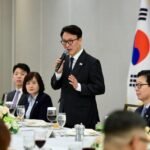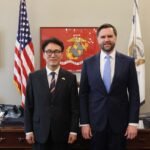Shinsegae wine shop
South Korean retail giant Shinsegae Group is set to sell luxury wines with price tags of as much as tens of thousand dollars in Seoul, as demand for the premium products remains healthy despite the slowing local wine market.
Shinsegae Department Store plans to open a shop at its Gangnam branch on June 10, which provides some 5,000 luxury wines including the world’s most expensive Liber Pater, the Domaine Leroy and Grand Cru classés, according to industry sources in Seoul on Thursday.
The 1,300 square meters (14,000 square feet) shop will offer various services for affluent customers such as luxury wine storage, private tasting and pairing events, as well as lectures by professional sommeliers.
The department expected the luxury wine sales to report strong growth although the South Korean market shrank.
“The high-end wine market is predicted to keep growing just as luxury goods are selling well even in an economic slowdown,” said a department store industry source.
LUXURY WINES TO CONTINUE GROWTH DESPITE MARKET SLOWDOWN
Shinsegae Department Store’s sales of wines, which are pricier than 1 million won ($733), rose more than 50% in the first five months of this year. South Korea’s wine imports fell 12.9% to $506 million last year.
The company’s Gangnam branch, located in Seocho District, one of the richest neighborhoods in South Korea and among the most expensive areas in Seoul, was the largest department store in the country by sales.
Shinsegae Department Store Gangnam’s revenue topped 3 trillion won last year, becoming the first single department store branch with higher sales than the mark in South Korea.
The No. 2 was Lotte Department Store Jamsil with sales of 2.8 trillion won.
By Sun A Lee
suna@hankyung.com
Jongwoo Cheon edited this article.















